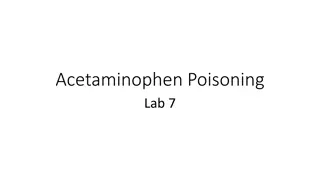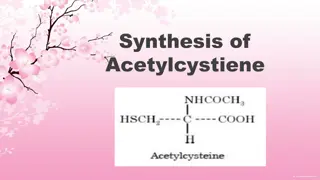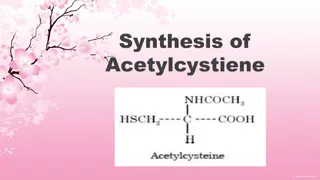Understanding Acetaminophen Poisoning: Mechanism, Toxicity, and Treatment
Acetaminophen poisoning occurs when the body is overwhelmed by high doses of the drug, leading to liver toxicity and potentially fatal consequences. The mechanism of toxicity involves the depletion of glutathione and the formation of a harmful metabolite, N-acetyl-para-benzoquinoneimine (NAPQI). Con
0 views • 9 slides
Synthesis of Acetylcysteine: Procedure, Uses, and Precautions
The synthesis of acetylcysteine involves acetylating L-Cysteine in the presence of acetic anhydride and sulfuric acid. Acetylcysteine has various uses, including reducing pulmonary secretions' viscosity, being an antidote for acetaminophen overdose, and chelating heavy metals. The procedure, precaut
0 views • 20 slides
Synthesis and Uses of Acetylcysteine
Acetylcysteine is synthesized by acetylating L-Cysteine in the presence of acetic anhydride and sulfuric acid. It finds various uses, including reducing pulmonary secretions' viscosity, treating acetaminophen overdose, and acting as a chelating agent. The procedure involves precise steps and precaut
1 views • 10 slides


